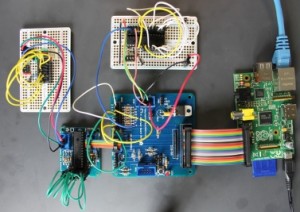Adafruit Clue - love at first sight
The Clue is a small single board computer that has the same format and connectors as the BBC micro:bit. It's more expensive than the micro:bit but it's a much, much more capable device.
micro:bit Pros and Cons
I still love the micro:bit. It invites you to interact with it as soon as you power it on and it's introduced a huge audience to the pleasures of programming.
There are a range of programming options for the micro:bit, including micropython, and it's easy to program using the free mu editor.
However, it has some frustrating limitations.
The micro:bit's 5x5 LED display is cute, but scarcely high-resolution. There are a few on-board sensors - an accelerometer and a magnetometer - and you can coax the processor chip into telling you how hot it is. It has a couple of buttons, and it supports radio communication with other micro:bits. But that's all.
It also has quite limited memory which can limit the complexity of the programs you write.
The micro:bit hardware has Bluetooth support, but its limited memory means that Bluetooth is not accessible from micropython.
The Clue blasts those limitations away.
Clue Power
Like the micro:bit, the clue can be programmed in Python. It supports CircuitPython, Adafruit's fork of micropython. That means that you get access to a library that's well documented, works reliably and supports a huge and growing range of peripherals from Adafruit and third parties. There's on-board Bluetooth and CircuitPython provides easy access.
My personal preference is to develop in Python but there's also support for the Arduino development environment.
The Clue has a great selection of peripherals on-board. Like the micro:bit, it has an accelerometer and compass, but it also has a gyroscope. You'll also find a light/colour/gesture sensors, a microphone, a buzzer and sensors to measure temperature, humidity and pressure. For me, though, the thing that instantly captured my heart was its crisp, colourful 1.3″ 240×240 TFT display.
Quick Start
Overall impressions of the Clue have been great. The hardware is very capable, and Adafruit's documentation is superb. Even if you have no Python experience, the Getting Started Guide will have you writing and running simple Python programs on the Clue in no time.
I bought an early alpha version of the Clue which has sold out. PyCon US attendees will be getting one as a freebie thanks to Adafruit and Digi-Key.
It may be a little while until the final production version is available but it will be worth the wait!
I'm currently working on some I2C applications on the original micro:bit, and I need an I2C monitor to help me troubleshoot. I have a couple of PC-based scopes that could do the job, but I think the Clue is up to the task, and it would be a fun project. I'll report on progress.





Comments
Post a Comment